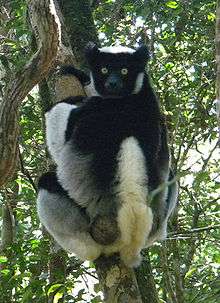indri
See also: Indri
English
WOTD – 26 June 2019
Etymology

An indri in Madagascar
Possibly from Malagasy endira (“the lemur Indri indri”). A common explanation asserts that the word comes from the Malagasy indry (pronounced /ˈiɳɖʐʲ/) meaning “lo!” or “behold!”, or from indry izy (“There he is!”), which guides shouted to the French naturalist Pierre Sonnerat (1748–1814) upon seeing the animal, and which Sonnerat mistook for its name,[1] but it has been suggested that Sonnerat studied indris too closely for this story to be plausible.[2]
Pronunciation
- (Received Pronunciation, General American) IPA(key): /ˈɪndɹi/
Audio (GA) (file) - Hyphenation: in‧dri
Noun
indri (plural indris)
- One of the largest living lemurs (Indri indri), native to Madagascar.
- 1819, “LEMUR”, in Abraham Rees, editor, The Cyclopædia; or, Universal Dictionary of Arts, Sciences, and Literature. [...] In Thirty-nine Volumes, volume XX, London: Printed for Longman, Hurst, Rees, Orme, & Brown, […], OCLC 7390852718, column 2:
- Indri, the ſecond new genus, conſiſts at preſent but of two ſpecies, the Linnæan lemur indri and the laniger; the former of which is lemur brevicaudatus of Geoffroy [i.e., Étienne Geoffroy Saint-Hilaire]; and the latter indri longicaudatus of the ſame author.
- [1873], Thomas Rymer Jones, “Order II. Quadrumana. Four-handed Mammals.”, in Mammalia: A Popular Introduction to Natural History, London: Frederick Warne and Co., […]; New York, N.Y.: Scribner, Welford, and Armstrong, OCLC 11651648, family IV (Lemuridæ. The Lemurs.), sub-family IV (Lichanotinæ. The Indris.), page 61:
- The indris are distuinguished by having only thirty teeth. [...] The Indri (Indris laniger) is the largest known species of the lemurine Quadrumana, measuring when erect more than three feet in height, and is of very remarkable form. [...] The indris inhabit the forests of Madagascar. They are very gentle, and although not remarkable for intelligence, are trained by the natives (who call the indri, "the man of the woods"), to hunt, probably for birds.
- 1993, Jan Sovak, Zoo Animals Coloring Book (Dover Pictorial Archive Series), New York, N.Y.: Dover Publications, →ISBN, page 20:
- The Indri (Indri indri; top left), the largest prosimian at up to three feet long (excluding tail) and 22 pounds, eats plant matter.
- 1999, Ernest Pillsbury Walker; Ronald M. Nowak, “Avahi, Sifakas, and Indri: Indriiae”, in Walker’s Primates of the World, Baltimore, Md.: Johns Hopkins University Press, →ISBN, page 84, column 2:
- The indri inhabits coastal and montane rainforest from sea level to about 1,800 meters.
- 2011, William Powell; Ochan Kusuma-Powell, “Knowing Our Collegial Relations”, in How to Teach Now: Five Keys to Personalized Learning in the Global Classroom, Alexandria, Va.: ASCD, →ISBN, page 134:
- Indris are known for their calls, some of which are truly eerie and can be heard for miles in the dense undergrowth.
-
Translations
Indri indri
|
|
References
- “indri, n.”, in OED Online

- Ian Hacking (October 1981), “Was There Ever a Radical Mistranslation?”, in Analysis, volume 41, issue 4, London: Oxford University Press, DOI:, ISSN 0003-2638, JSTOR 3327741, OCLC 709962587, pages 173–174; Alexander R. Dunkel; Jelle S. Zijlstra; Colin P. Groves (2011–2012), “Giant Rabbits, Marmosets, and British Comedies: Etymology of Lemur Names, Part 1”, in Lemur News, volume 16, pages 67–68.
Finnish
Declension
| Inflection of indri (Kotus type 5/risti, no gradation) | |||
|---|---|---|---|
| nominative | indri | indrit | |
| genitive | indrin | indrien | |
| partitive | indriä | indrejä | |
| illative | indriin | indreihin | |
| singular | plural | ||
| nominative | indri | indrit | |
| accusative | nom. | indri | indrit |
| gen. | indrin | ||
| genitive | indrin | indrien | |
| partitive | indriä | indrejä | |
| inessive | indrissä | indreissä | |
| elative | indristä | indreistä | |
| illative | indriin | indreihin | |
| adessive | indrillä | indreillä | |
| ablative | indriltä | indreiltä | |
| allative | indrille | indreille | |
| essive | indrinä | indreinä | |
| translative | indriksi | indreiksi | |
| instructive | — | indrein | |
| abessive | indrittä | indreittä | |
| comitative | — | indreineen | |
Tocharian B
Alternative forms
Derived terms
Further reading
- Adams, Douglas Q. (2013), “indri”, in A Dictionary of Tocharian B: Revised and Greatly Enlarged (Leiden Studies in Indo-European; 10), Amsterdam, New York: Rodopi, →ISBN, page 69
This article is issued from
Wiktionary.
The text is licensed under Creative
Commons - Attribution - Sharealike.
Additional terms may apply for the media files.